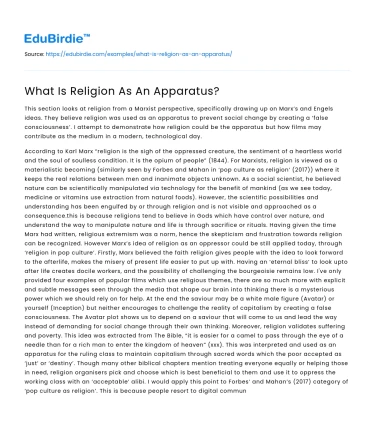This section looks at religion from a Marxist perspective, specifically drawing up on Marx’s and Engels ideas. They believe religion was used as an apparatus to prevent social change by creating a ‘false consciousness’. I attempt to demonstrate how religion could be the apparatus but how films may contribute as the medium in a modern, technological day.
According to Karl Marx “religion is the sigh of the oppressed creature, the sentiment of a heartless world and the soul of soulless condition. It is the opium of people” (1844). For Marxists, religion is viewed as a materialistic becoming (similarly seen by Forbes and Mahan in ‘pop culture as religion’ (2017)) where it keeps the real relations between men and inanimate objects unknown. As a social scientist, he believed nature can be scientifically manipulated via technology for the benefit of mankind (as we see today, medicine or vitamins use extraction from natural foods). However, the scientific possibilities and understanding has been engulfed by or through religion and is not visible and approached as a consequence.this is because religions tend to believe in Gods which have control over nature, and understand the way to manipulate nature and life is through sacrifice or rituals. Having given the time Marx had written, religious extremism was a norm, hence the skepticism and frustration towards religion can be recognized. However Marx’s idea of religion as an oppressor could be still applied today, through ‘religion in pop culture’. Firstly, Marx believed the faith religion gives people with the idea to look forward to the afterlife, makes the misery of present life easier to put up with. Having an ‘eternal bliss’ to look upto after life creates docile workers, and the possibility of challenging the bourgeoisie remains low. I've only provided four examples of popular films which use religious themes, there are so much more with explicit and subtle messages seen through the media that shape our brain into thinking there is a mysterious power which we should rely on for help. At the end the saviour may be a white male figure (Avatar) or yourself (Inception) but neither encourages to challenge the reality of capitalism by creating a false consciousness. The Avatar plot shows us to depend on a saviour that will come to us and lead the way instead of demanding for social change through their own thinking. Moreover, religion validates suffering and poverty. This idea was extracted from The Bible, “it is easier for a camel to pass through the eye of a needle than for a rich man to enter the kingdom of heaven” (xxx). This was interpreted and used as an apparatus for the ruling class to maintain capitalism through sacred words which the poor accepted as ‘just’ or ‘destiny’. Though many other biblical chapters mention treating everyone equally or helping those in need, religion organisers pick and choose which is best beneficial to them and use it to oppress the working class with an ‘acceptable’ alibi. I would apply this point to Forbes’ and Mahan’s (2017) category of ‘pop culture as religion’. This is because people resort to digital communication as an escape mechanism from reality or to ease the pain of suffering the capitalist, unjust economy produces. Easily accessible streaming platforms, such as Netflix, Amazon Prime Video, Hulu etc potentially divert the attention of an average man from the reality and pressing issues. In this sense, digital platforms are operated as religion where the religion makes a virtue out of suffering and hence the metaphor of ‘religion is an opium’. Religion, whether it is a belief system or another operation as religion, offers supernatural intervention to solve manmade problems, thus many believe it is pointless to try and do anything to improve their current condition. This is the goal of the ruling class, to create social inequality which has been achieved by using religion as an apparatus and transferring their ideology through religion and many social actors as the medium i.e. films, education, workplace etc. Historical evidence which supports the Marxist view of the role of religion in society appears in most religions. This can be seen in the traditional caste system in India by Hindu religious beliefs, where the sub-group, sect or family background pre-determined an individual’s worth or class. From anecdotal experience it is still seen in India and South Asia today, where the higher castes do not want to be associated with lower castes even though they are of one nationality. The hierarchy is apparently related and situated by religion but the consequences and oppression were created by man.
Save your time!
We can take care of your essay
- Proper editing and formatting
- Free revision, title page, and bibliography
- Flexible prices and money-back guarantee
In summary, Marx and Engels see religion as an apparatus used to create false consciousness so the social inequality remains or widens between the proletariat and bourgeoisie. Religion as a sacred element provides the perfect tool to transfer this ideology because the proletariat do not challenge it and accept it as God’s plan. This myopia then contributes to the suffering of the poorer whilst the religious organisers and bourgeoisie supported one another to remain dominant. I apply this to not only this ideology through religious themes in films but also creating other forms of ‘faith’ and ‘hope’ people latch onto found in popular culture.






 Stuck on your essay?
Stuck on your essay?

